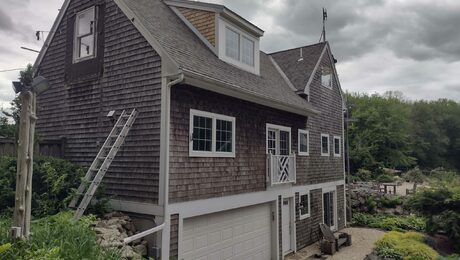A few issues ago, Fine Homebuilding letters had an entry about keeping basement humidity low with the simple use of a fan to move air from outside the basement. I have a basement, storing lumber, and would love to keep it dry, and could simply circulate air from my shop above, which is heated and cooled. But I don’t understand the dynamics of basement humidity. I had always thought that basements were humid because warm, humid air from outside the basement hit cool, earth-contact walls and floor, lowering air temperature and therefore increasing its humidity. Wouldn’t air blown into a basement just cool and become more humid? Or is evacuating air out of the basement what does the trick? Any help with this puzzle would be appreciated.
Discussion Forum
Discussion Forum
Up Next
Video Shorts
Featured Story

Listeners write in about ventilation and radon control and ask questions about tightening basement garages, ventilation solutions, and safer paint stripper.
Featured Video
SawStop's Portable Tablesaw is Bigger and Better Than BeforeHighlights
"I have learned so much thanks to the searchable articles on the FHB website. I can confidently say that I expect to be a life-long subscriber." - M.K.
Fine Homebuilding Magazine
- Home Group
- Antique Trader
- Arts & Crafts Homes
- Bank Note Reporter
- Cabin Life
- Cuisine at Home
- Fine Gardening
- Fine Woodworking
- Green Building Advisor
- Garden Gate
- Horticulture
- Keep Craft Alive
- Log Home Living
- Military Trader/Vehicles
- Numismatic News
- Numismaster
- Old Cars Weekly
- Old House Journal
- Period Homes
- Popular Woodworking
- Script
- ShopNotes
- Sports Collectors Digest
- Threads
- Timber Home Living
- Traditional Building
- Woodsmith
- World Coin News
- Writer's Digest


















Replies
I think it may have to do with the number of air exchnages.
I've inspected several homes with a fan which sucks air from basement floor level and exhausts it out doors -- necessarily pulling replacement air from "upstairs."
They have had lower than "normal" humidity - I think that is ultimately a matter of using airflow to reduce moisture content in floors, walls, etc.
"Ask not what the world needs. Ask what makes you come alive... then go do it. Because what the world needs is people who have come alive."
Howard Thurman
That makes sense. By evacuating basement air, you're not lowering the humidity, you're simply replacing the air with low-humidity (upstairs) air. The slight loss of heating energy would be worth it.
Would it work equally well by simply exchanging upstairs and downstairs air? In other words, recirculating air between floors. The humidity should eventually settle into the same for both rooms. Does that fit with your experience?
Generally the humidity (in dewpoint terms) is higher in a basement because moisture is transported through the walls from the soil. If you simply mix the basement air with the rest of the air in the house, you'll raise the humidity in the whole house. In theory it could eventually get to the same level as where the unmixed basement started.Of course, in many homes the humidity would escape (in winter, at least), once mixed into the rest of the house air (and, in fact, the rest of the house might appreciate the increased humidity). In a tightly sealed home, however, the humidity wouldn't escape very well (but in such homes you'd presumably already have some sort of air exchange system).But expelling air out of the basement to dry it is probably most useful in warmer weather, when either the AC is running or the (upstairs) windows are open.
The modern conservative is engaged in one of man's oldest exercises in moral philosophy; that is, the search for a superior moral justification for selfishness. -John Kenneth Galbraith
Well, I've only wondered about basement humidity for twenty years, so this is great. I guess it never occurred to me that moisture could be coming in from the ground.
I have sealed all the basement concrete walls and floor with Dry-Lok paint. This may explain why, the few times I've measured humidity there with a handheld psychrometer, it's been lower than I would have expected. If what you are saying is true, I should be getting only a little moisture through earth contact.
In the summer however, as you noted, humidity does seem to be higher. Could the outside air (very humid in summer here) be a secondary cause of humidity in the summer? If so, it must be migrating into the basement, perhaps through the usual small but steady air changes through the gaps I know my basement has.
In the summer you do get humid air from outside coming in, cooling, and thus generating a higher relative humidity.
The modern conservative is engaged in one of man's oldest exercises in moral philosophy; that is, the search for a superior moral justification for selfishness. -John Kenneth Galbraith
The slight loss of heating energy would be worth it.
It could be a lot more than "slight" if you're pushing 100 cfm or more out in the winter. Depending on the volume of your basement (and shop, if that's the source of makeup air) this could result in 1 or more air changes per hour.
Since you've already sealed the walls, look for any other moisture incursion and stop them at the source. Then consider whether you're keeping basement windows open during hot, humid weather which will cause a dramatic rise in indoor RH as outside air is cooled (and possibly condensation on cool walls or floor).
Just as a vented crawlspace can be a moisture disaster in the summer, so can a vented basement.
If those initial tactics don't help, then you might consider a small space heater or a dehumidifier in the basement rather than moving the moisture up into your shop. Or you might consider insulating the basement and warming its temperature passively.
Riversong HouseWright
Design * * Build * * Renovate * * ConsultSolar & Super-Insulated Healthy Homes
Edited 1/22/2009 11:26 pm ET by Riversong
Another point. I think that a basement tends to be inherently a little tighter than your upstairs ... thus retaining any moisture it tends to gain ... regardless of the source. Also possible source is wood drying??
In theory ... mixing air from the basement with the upper levels does two things: raises the basement temp (lowering RH) and moves some of the moisture into your shop/upstairs. Assuming the shop has some ventilation (i.e. exhaust), it will help get rid of any excess RH through the exhaust/air leakage process.
Exhausting from the basement to outside will draw air from the shop above and accomplish everything ... including an increase in heat loss due to higher basement temp ... but that may be worth the compromise.
Thanks for taking the time to respond to me, and for the valuable information. I think I'm about ready to try something and see what happens. I will try the two-room circulation first and see what happens to the humidity in the basement (and upstairs). I'll post back here with any success or other results I have.
It's all just food for thought ... meant to get you out of any thinking inside the box you may or may not have been in. More points of view help you think through problems ... even wrong points of view, sometimes. Brainstorming the possibilities will help better understand the full width and breadth of the situation.
Oh please ... I need to quit philosophizing ... where's the duct tape ... I gotta tape my hands to my side.
No, no, don't tie hands down...you're right. Very well put, I could not have said it better. Puzzle out the whole problem. I'm going to get out the psychrometer and do some hard science.
Back to the original poster's question: can anyone identify which issue that article was in? I kind of remember a one page (?) article with an illustration that showed a fan circulating air from basement to top floor. I've been trying to find that article again, but can't put my fingers on it.
Thanks,
You might want to read what the folks at Humidex say about basement air:
http://www.humidexatlantic.com/content/humidex-solution/humidex-vs-dehumidifier.cfm
This unit was highly recommended to us by our basement contractor after he installed the French drains. It is fairly similar to the homemade one posted a few issues back in FHB, except that it has a control that kicks the unit on when the humidity reaches a pre-set level. It runs very quietly.
Johnny